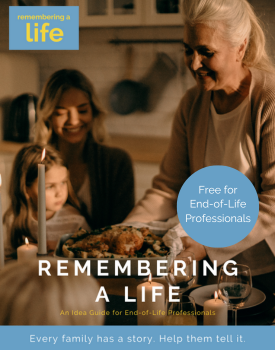If there is ever a time to remember the importance of self-care, it’s during your grief journey. As a therapist specializing in grief and a person who has experienced loss, I firmly believe that it is crucial to care for ourselves as we heal from the death of a loved one. Learning how to lean into the practices that carry me through my own grief has provided a vital source for healing – something we all have a right to. Self-care, however, can feel like a nebulous buzzword and even if we believe that it’s beneficial to engage in, it can be confusing to know where to begin. Receiving Remembering A Life’s Self-Care Box is a really helpful place to start, offering tools for reflection, grounding, and comfort during the days that we need it most.
Upon looking at the box, three items stood out for their particularly integral roles in grief care. One is the journal, crafted to support reflection. In a 1976 article from the New York Times, titled “Why I Write,” Joan Didion stated, “I write entirely to find out what I’m thinking, what I’m looking at, what I see, and what it means.” To echo her sentiment, I have found that writing can help us make sense of our feelings and experiences, which are undoubtedly complicated and nuanced in grief. While the journal comes with useful prompts, there are many individual ways that journaling can be useful to us after loss. One option is to write down memories of our loved one who died. Another is to write simple daily reflections on our emotions and coping strategies, or even draw on the days when the words just won’t come.
Another key item in the box is the water bottle, reminding us to hydrate and further engage in self-care practices that attend to our physical bodies. When we think of grief, we often think of immense sadness, perhaps anger, or even guilt. What we seem to focus on less are the somatic components of grieving. In the early days of loss, many encounter changes in our sleep, appetite, or energy level, and find that we need to keep track of this and attend to ourselves accordingly. One of the simplest ways to care for ourselves is to give our grieving bodies what they need, hydration included.
If the journal helps you prioritize your mind, and the water bottle helps you care for your body, then the memory jar supports your spirit. In grief, it is normal to worry about losing our memories of those we have lost. One way to quiet this fearful voice is to jot down a memory when it comes up, save the paper, and place it into the memory jar. On a special day like an anniversary or birthday, pull and read these memories. We can also incorporate the candle provided in the box, lighting it as part of our remembrance ritual. Saving memories in this way not only helps us to maintain our connection to the person we lost, but it also turns remembering into an activity that we can share. One way to do this is by pulling the memories from the jar on a special date alongside trusted family or friends.
Not only can we purchase the Self-Care Box for ourselves in grief, we can also send it to someone we care about who is going through a loss. Knowing where and how to step into someone’s grief journey can feel intimidating. Many worry about saying or doing the wrong thing and potentially adding fuel to the fire of painful feelings that our loved one is contending with. Something helpful to keep in mind is that folks who are in the very early days of a loss often experience numbness and the sense that they are “on autopilot”. Naming their needs in this state and engaging in typical daily tasks can suddenly feel challenging to them. In response, a gift like the Self-Care Box can help by providing tangible pieces of support that releases the grieving person from the burden of telling us what we can do for them and shows they are loved and cared for.
Having experienced loss early in life, I know firsthand that it is a heavy and deeply transformative experience that shapeshifts over time, meaning that our needs around it will vary as we move forward in life. We always carry some grief with us, even if it is no longer debilitating, like it may have been in the very beginning. The Self-Care Box contains elements that are especially helpful in early grief, such as the water bottle, when the importance of keeping our cups full is at an all-time high. It also contains items that we may take more interest in further down the road when we are able to make more space for reflection, such as the memory jar. Self-care can take on so many meanings and there is no incorrect time to start engaging in it, whether we have experienced a loss weeks or even years ago.

